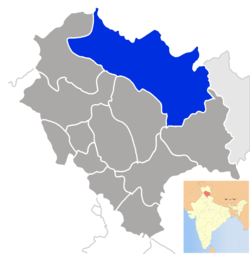Lahul and Spiti
| Lahaul and Spiti लाहौल और स्पीति जिला district |
|
|---|---|
| District of Himachal Pradesh | |
 Location of Lahaul and Spiti लाहौल और स्पीति जिला district in Himachal Pradesh |
|
| Country | India |
| State | Himachal Pradesh |
| Administrative division | Two |
| Headquarters | Keylong |
| Government | |
| • Assembly seats | 01 |
| Area | |
| • Total | 13,833 km2 (5,341 sq mi) |
| Population (2011) | |
| • Total | 31,564 |
| • Density | 2.3/km2 (5.9/sq mi) |
| • Urban | None |
| Demographics | |
| • Literacy | 86.97% (male), 66.5% (female) |
| • Sex ratio | 916 |
| Major highways | one (Manali-Leh National Highway) |
| Average annual precipitation | Scanty Rainfall mm |
| Website | [hplahaulspiti |
The district of Lahaul-Spiti in the Indian state of Himachal Pradesh consists of the two formerly separate districts of Lahaul and Spiti. The present administrative centre is Keylong in Lahaul. Before the two districts were merged, Kardang was the capital of Lahaul, and Dhankar the capital of Spiti. The district was formed in 1960.
Kunzum la or the Kunzum Pass (altitude 4,551 m; 14,931 ft) is the entrance pass to the Spiti Valley from Lahaul. It is 21 km from Chandra Tal. This district is connected to Manali through the Rohtang Pass. To the south, Spiti ends 24 km from Tabo, at the Sumdo where the road enters Kinnaur and joins with National Highway No. 22.
The two valleys are quite different in character. Spiti is more barren and difficult to cross, with an average elevation of the valley floor of 4,270 m (14,009 ft). It is enclosed between lofty ranges, with the Spiti river rushing out of a gorge in the southeast to meet the Sutlej River. It is a typical mountain desert area with an average annual rainfall of only 170 mm (6.7 inches).
It is the fourth least populous district in India (out of 640).
The harsh conditions of Lahaul permit only scattered tufts of hardy grasses and shrubs to grow, even below 4,000 metres. Glacier lines are usually found at 5,000 metres.
Animals such as yaks and dzos roam across the wild Lingti plains. However, over-hunting and a decrease in food supplies has led to a large decrease in the population of the Tibetan antelope, argali, kiangs, musk deer, and snow leopards in these regions, reducing them to the status of endangered species. However, in the Lahaul valley, one can see ibex, brown bears, foxes and snow leopards during winter.
...
Wikipedia
